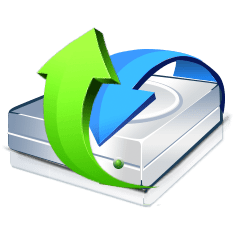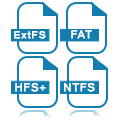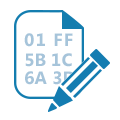- R-Studio for Linux
- Help & Manual
R-Studio for Linux extends the family of powerful and cost-effective data recovery software from R-TT to the Linux operating system. Thanks to R-Studio for Linux's flexible parameters and customizable settings, users get absolute control over their data recovery tasks. R-Studio for Linux recovers data from logical disks and partitions as well as disks and partitions that have been re-formatted, damaged or deleted. In addition to disks with common Linux file systems, R-Studio for Linux recovers files from Windows, FreeBSD/OpenBSD/NetBSD/Solaris, and Macintosh formatted disks. Moreover, raw file recovery (scan for known file types) can be used for heavily damaged or unknown file systems. Recovered files can be saved to disks with any file system supported by the Linux kernel (i.e. ext2, ext3, FAT, NTFS).

| Download page | |
|
from
$79.99
| Buy online |









Ext2/3/4FS and XFS (created by Linux or another OS), FAT12, FAT16, FAT32, NTFS/NTFS5 with data deduplication, exFAT, ReFS/ReFS2+/ReFS 3.4, APFS (including encryption), HFS+, HFSX, HFS, and UFS1, UFS2, UFS BigEndian (used by the FreeBSD, OpenBSD, and NetBSD operating systems), ISO9660 (CDs/DVDs/Images), UStar/Tar/CPIO/Pax* (Tape drives).
* R-Studio Technician versions only
Damaged RAID recovery. Standard RAID levels supported: volume set, 0, 1, 4, 5, 6. Nested and non-standard RAID level supported: 10(1+0), 1E, 5E, 5EE, 6E. Support for parity delays in all applicable levels. Support for customer-specified RAID layouts.
Automatic RAID parameter recognition. R-Studio can recognize all RAID parameters for RAID 5 and 6. This feature helps the user to solve one of the most difficult problems in RAID recovery - RAID parameter recognition.
An advanced algorithm for raw file recovery (search for file signatures): R-Studio's known file types search recognizes the file structure of common file types, allowing you to recover data from disks where the file system is damaged or unknown (i.e. HDDs, CDs, DVDs, floppy disks, Compact Flash Card, USB drives, ZIP drives, memory sticks, and other removable media).
User-defined known file types. It's possible to create very complex definitions to accurately identify non-standard file type.
Estimation of chances for successful file recovery.
Supported Operating Systems: Recovers data from networked computers running Win2000, XP, Vista, Win7, Win8, Mac OS X or Linux and certain UNIX platforms.
Almost all R-Studio's files (images, scan info, logs, etc.) can be saved to and load from, a remote computer.
Low bandwidth, low data transfer: Data recovery and analysis processes run locally (on the host computer with the damaged/deleted disks), rather than on the remote technician's computer to increase data recovery speed and reduce bandwidth. Likewise, recovered data can be saved to a local disk without being transferred over the network.
Disk imaging: R-Studio can create exact duplicates of entire disks, logical disks or partitions. Disk images are compatible with all previous versions of R-Studio.
Advanced disk imaging: Disk images can be split, compressed and password-protected. These disk images require the current version of R-Studio or R-Drive Image.
Disk imaging and scan can be performed simultaneously.
Advanced object copy: In addition to byte-to-byte copy of any object visible in the Drives panel, partitions and hard drives can be smart-copied with certain parameters changed.
Two advanced disk imaging methods in R-Studio Technician: runtime and multi-pass disk imaging algorithms that make R-Studio for Linux the cornerstone of a powerful data recovery workstation.
All versions of R-Studio can create images in the rdr file format(native for R-TT products), including its encryption, and load VMDK/VHD/VHDX/VDI files, R-Studio Corporate and Technician/T80+ versions can create them.
Bootable R-Studio Emergency Disk. R-Studio Emergency (32/64 bit) version can boot directly from an external USB drive, optical disc or several floppy disks. Useful for recovering data from internal hard drives on computers that cannot startup due to damaged or corrupted file systems.
Improved emergency startup for UEFI computers.
-
R-Studio for Linux recovers files:
- Deleted from the computer and emptied from the Trash
- Corrupted due to a virus, power failure or sudden shutdown
- From disks that have been Re-formatted to the same file system or a different file system
- Damaged and have bad sectors:
R-Studio for Linux creates an image of the entire disk and recovers it from there to prevent further physical damage to the disk. The Technician version of R-Studio for Linux supports two advanced disk imaging algorithms: runtime and multi-pass disk imaging. In addition, R-Studio for Linux supports sector map files, both in internal and third-party formats. - Data recovery from damaged or deleted partitions.
-
Support for:
- Linux Logical Volume Manager (LVM/LVM2) and mdadm RAIDs;
- Windows Storage Spaces (created by Windows 8/8.1 and 10/Threshold 2/Anniversary update);
- Apple software RAIDs, CoreStorage, File Vault, and Fusion Drive (APFS/HFS+);
- Bitlocker Drive Encryption, both for BitLocker Drive Encryption and BitLocker ToGo volumes;
- Supports basic and dynamic disks (including unsyncronized Windows software RAIDs).
- Support for Intel Software RAIDs.
R-Studio can automatically recognize and assemble the components of these disk managers even if their databases are slightly damaged. Their components with severe corrupted databases can be added manually.- Support for VMDK/VHD/VHDX/VDI file formats. Read-only for all versions, creation for Technician/T80+ versions.
- Read-only support for dmg files (Apple Disk Image: all versions ), E01/(EWF) files (Expert Witness File Format: R-Studio Technician/T80+), and AFF files (Advanced Forensic Format: R-Studio Technician/T80+).
-
Support for specific file system features:
- Localized name recognition.
- Recovery of names and paths for files deleted to Recycle Bin and Trash.
- Advanced Ext2/3/4FS recovery: support for hard links, extended file attributes, and the file system journal.
- Advanced UFS recovery: support for extended file attributes and the soft updates journal.
- Advanced NTFS recovery: support for compressed and encrypted files, alternative data streams, deduplication, $LogFile, hard links, directory junctions, and symbolic links.
- Advanced ReFS recovery: symbolic links, directory junctions, deduplication.
- Advanced HFS/HFS+ recovery: support for compressed files, extended file attributes, hard links, file system journal, and resource forks.
- Advanced APFS recovery: support for encryption.
- Support for Directory Junctions and Symbolic Links.
-
Advanced data recovery algorithm:
- Estimation of chances for successful file recovery.
- Real-time progress status and file preview: During the scan, R-Studio graphically displays items found in the R-Studio Scan Information panel, including files of known types, FAT and NTFS MFT records, boot records, etc.
- Advanced search capabilities. Files can be searched for and automatically marked for recovery using their file names, file masks, sizes, date/time stamps, etc. The search and mark supports regular expressions.
- Search for deleted file versions. R-Studio for Linux can search for deleted file versions using their sizes, names and extensions, and recognized file types as the search parameters.
- File can be sorted by their types (extensions) and date/time stamps.
- Mass file recovery: Save time by selecting multiple files or using Recover All.
- Extended duplicate file processing options.
- File Recovery Lists: lists of files found on disks that can be exported out of R-Studio, manually edited, than imported back, and files from those lists will be automatically marked for recovery. Such lists are very useful if you want someone who is far away to decide which files are to recover and which aren't to.
- Detailed file information. Comprehensive file information in the Technician version: specific file system info, overlapping files, disk regions, etc.
- Advanced file search and mask options.
- File recovery lists for mass file recovery. File recovery lists with comprehensive file information in the Technician version.
- Alternative paths for places to store recovered files and images (Technician version only).
- Post Action options for unattended operations (Technician version only): automatic shutdown upon completion of lengthy operations (file recovery, disk scan, and disk imaging) and automatic email notification regarding operation success/failure.
- Multilingual interface. Languages supported: English, German, French, Spanish, Portugal, Russian, Simplified and Traditional Chinese, Japanese.
- Forensic mode. Creates an audit log that can be presented in court hearings. (Technician version only).
- Data wiping for drives to prevent accidental data leaks when the drives are to be sold, given away, or disposed off in any other way.
- Support for DiskSpar Disk Imager images and disk maps. R-Studio can read and process images and disk maps created by the DiskSpar Disk Imager without R-Studio.
- Data Recovery Guide
- Why R-Studio?
- R-Studio for Forensic and Data Recovery Business
- R-STUDIO Review on TopTenReviews
- File Recovery Specifics for SSD devices
- How to recover data from NVMe devices
- Predicting Success of Common Data Recovery Cases
- Recovery of Overwritten Data
- Emergency File Recovery Using R-Studio Emergency
- RAID Recovery Presentation
- R-Studio: Data recovery from a non-functional computer
- File Recovery from a Computer that Won't Boot
- Clone Disks Before File Recovery
- HD Video Recovery from SD cards
- File Recovery from an Unbootable Mac Computer
- The best way to recover files from a Mac system disk
- Data Recovery from an Encrypted Linux Disk after a System Crash
- Data Recovery from Apple Disk Images (.DMG files)
- File Recovery after Re-installing Windows
- R-Studio: Data Recovery over Network
- How To Use R-Studio Corporate Package
- Data Recovery from a Re-Formatted NTFS Disk
- Data Recovery from an ReFS disk
- Data Recovery from a Re-Formatted exFAT/FAT Disk
- Data Recovery from an Erased HFS Disk
- Data Recovery from an Erased APFS Disk
- Data Recovery from a Re-Formatted Ext2/3/4FS Disk
- Data Recovery from an XFS Disk
- Data Recovery from a Simple NAS
- How to connect virtual RAID and LVM/LDM volumes to the operating system
- Specifics of File Recovery After a Quick Format
- Data Recovery After Partition Manager Crash
- File Recovery vs. File Repair
- Data Recovery from Virtual Machines
- How to Connect Disks to a Computer
- Emergency Data Recovery over Network
- Data Recovery over the Internet
- Creating a Custom Known File Type for R-Studio
- Finding RAID parameters
- Recovering Partitions on a Damaged Disk
- NAT and Firewall Traversal for Remote Data Recovery
- Data Recovery from an External Disk with a Damaged File System
- File Recovery Basics
- Default Parameters of Software Stripe Sets (RAID 0) in Mac OS X
- Data Recovery from Virtual Hard Disk (VHD/VHDX) Files
- Data Recovery from Various File Container Formats and Encrypted Disks
- Automatic RAID Parameter Detection
- IntelligentScan Data Recovery Technology
- Multi-pass imaging in R-Studio
- Runtime Imaging in R-Studio
- Linear Imaging vs Runtime Imaging vs Multi-Pass Imaging
- USB Stabilizer Tech for unstable USB devices
- Joint work of R-Studio and PC-3000 UDMA hardware
- Joint work of R-Studio and HDDSuperClone
- R-Studio T80+ - A Professional Data Recovery and Forensic Solution for Small Business and Individuals Just for 1 USD/day
- Backup Articles
- R-Drive Image Standalone and Corporate license transferring
- Backup with Confidence
- R-Drive Image as a free powerful partition manager
- Computer Recovery and System Restore
- Disk Cloning and Mass System Deployment
- Accessing Individual Files or Folders on a Backed Up Disk Image
- Creating a Data Consistent, Space Efficient Data Backup Plan for a Small Business Server
- How to Move the Already Installed Windows from an Old HDD to a New SSD Device and Create a Hybrid Data Storage System
- How to Move an Installed Windows to a Larger Disk
- How to Move a BitLocker-Encrypted System Disk to a New Storage Device
- How to backup and restore disks on Linux and Mac computers using R-Drive Image
- Undelete Articles
- Get Deleted Files Back
- Free Recovery from SD and Memory cards
- R-Undelete: Video Recovery
- Recovery from an External Device with a Damaged File System
- File recovery from a non-functional computer
- Free File Recovery from an Android Phone Memory Card
- Free Photo and Video File Recovery Tutorial
- Easy file recovery in three steps
Rating: 4.9 / 5
Bought it and 100% recommend it for anyone with a similar issue.
Thank you very much for R-Studio for Linux.
Please pay attention to new Linux package manager `Snappy` => https://snapcraft.io/
Good luck!
Regrettably it`s not possible to simply restore the accidently zapped partitions ?
An installer wiped my boot drive without asking and erased LVM and other partitions.





